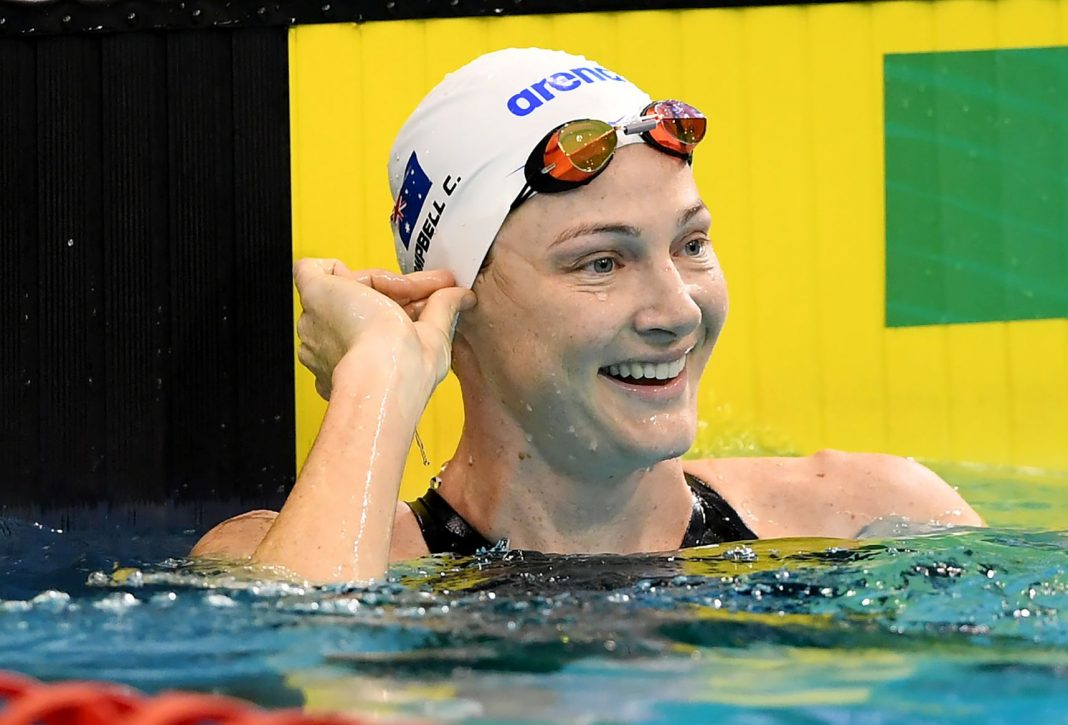For a re-tuned Cate Campbell, this isn’t a redemption song.
The Australian swimmer is over her “greatest choke in Olympic history”.
Gone, her “shame”, her “embarrassment”.
Gone, being “Australia’s poster girl for failure”.
Going to Tokyo to seek redemption for her flop at the 2016 Rio Olympics? No way.
“I’m not going to Tokyo to atone for 2016,” Campbell has said.
Campbell’s failure in the 100m freestyle in Rio triggered a sustained period of self-loathing.
Campbell entered as favourite and world record holder. She finished sixth.
After wobbling on the starter’s blocks, Campbell swam in a panic, thinking she would be disqualified; her meticulous race plan sinking in a muddled mind.
“The world got to witness possibly the greatest choke in Olympic history,” Campbell said at the time.
Her self-angst was all encompassing and her coach Simon Cusack feared Campbell would quit swimming.
“I didn’t expect her to be back after Rio to be honest,” Cusack has said.
“I thought she would be lost to the sport.”
Campbell herself wasn’t sure either.
She didn’t swim for three months, opted out of national selection for a year including the 2017 world championships.
“Basically me and the sport needed some time apart,” she said.
The period became one of self-discovery, of realising she had identity out of the water.
“I knew Cate Campbell the swimmer but I didn’t know Cate Campbell the person,” she said in 2018.
Campbell the person realised Campbell the swimmer needed a re-build.
On return to Australia from Rio, Campbell received thousands of social media messages. Many were supportive.
Others, from what she described as the worst side of society, labelled her a failure and waste of taxpayer’s money, among other things.
But she found solace in strangers, particularly two sisters, then aged 10 and 13, who wrote her an old-fashioned letter.
Elin and Nele Schulz both wrote of how proud they were of Campbell, urging her not to get down on herself.
Campbell said the physical letter from the sisters “reached across the great divide” more than any message on social media.
She also sought out sports psychologists and physiologists who worked with Australia’s elite armed forces unit, the SAS.
“You think we have to perform under pressure … these guys have to perform under fire, they have to remain cool, calm and collected in the face of death,” Campbell has said.
“That has been really eye-opening.
“I have found (focussing on) breathing has been really important.
“But also simple things like finding things in life to be grateful for.”
Campbell returned to international competition at the 2018 Commonwealth Games on the Gold Coast.
She won gold as part of Australia’s 4x100m freestyle relay team which set a world record; she won the 50m freestyle in a Commonwealth record; she won gold in the 50m butterfly despite having no experience in the stroke; she won silver, behind her sister Bronte, in the 100m freestyle.
But it wasn’t until four months after the Commonwealth Games, in August 2018, that Campbell’s cathartic leap came.
She published an open letter online aimed at her critics.
“You could not have been more ashamed of me than I was of myself,” she wrote.
“You could not have judged me harsher than I was (and to an extent still am) judging myself.
“In saying that, I did feel your disappointment, I did feel your shame and I felt your judgement.
“For future reference, when you see someone choking, it’s not because they don’t care – it’s because they care too much.
“I went into the Games as one kind of role model and came out another a very different one … Australia’s poster girl for failure.”
Now, on the cusp of her fourth Olympics, Campbell is free again.
She’ll carry the Australian flag with basketballer Patty Mills at the opening ceremony in Tokyo, an honour which carries deep meaning for Campbell.
“After a setback, everyone can feel a bit isolated,” Campbell said last week.
“And I know that I definitely felt that – whether or not it was completely true after Rio was another question.
“To be selected for this honour it really shows how much people get behind their athletes win, lose or draw – and I have done all of those.
“To be able to still feel the love and the support of the nation behind me is a really freeing and uplifting feeling.”
AAP
Get the latest Canberra news, sport, entertainment, competitions and more delivered to your inbox with the Canberra Daily Daily Newsletter. Sign up here.
Read more:



